
Every business owner is looking for that one-of-a-kind campaign that will transform organic website traffic, web pages, email newsletters, and other copy into bags of money. To create that marketing content link to the customer, some essentials, such as quality and trust, must be present through the heart of all your content. The good news is that your choice of words is your first line of action in establishing trust, whether through brand copy, SEO campaigns, online profiles, social media marketing, landing page content, and much more. Email marketing is more competitive than it’s ever been. According to research, around 333.2 billion emails are sent each day. This is projected to reach 376.4 billion daily by 2025. Thus, you must learn how to use the psychology of power words to make the most of it.
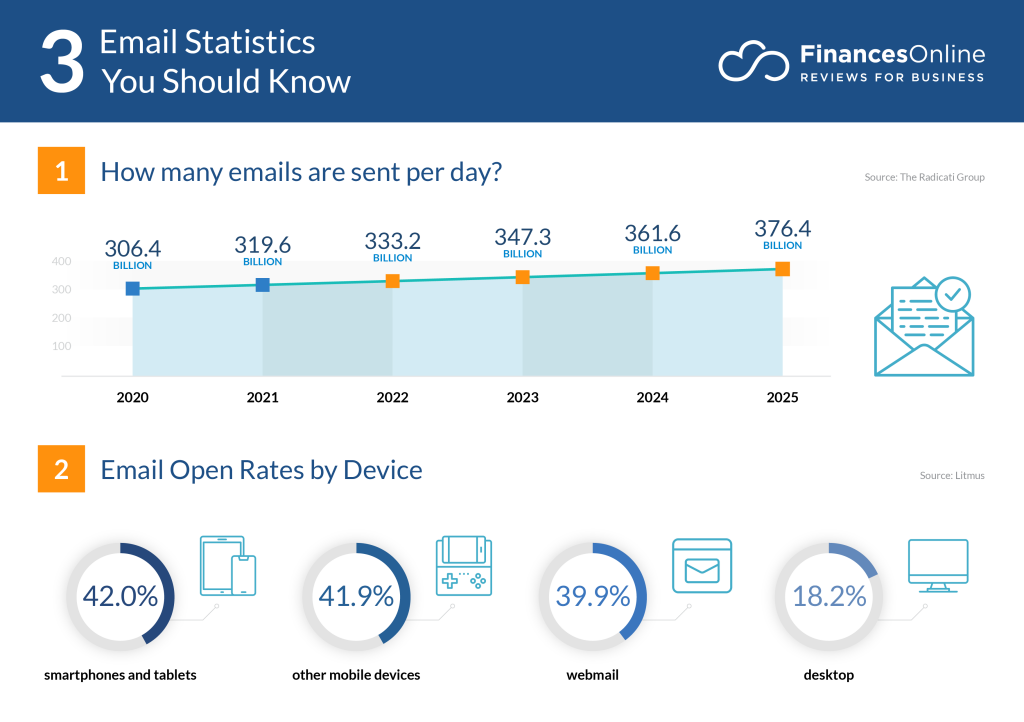
Reevaluating how you write your email copy can be the trick to boosting engagement rates for your email campaign. Using words that are direct and persuasive can be effective when it comes to inspiring your readers to take action.
Having established that fact, wouldn’t it be great to have a list of proven power words on which you can build a foundation for a successful email campaign?
In this post, we’ll consider some effective power words to incorporate into your email campaign based on purpose and context. These words leverage several psychological elements that boost client retention and encourage your readers to act.
Understanding the Psychology of Power Words
Power words trigger psychological or emotional responses in your audience. They engage with the reader’s imagination and prompt emotional connections to reach the desired end.
According to Herschell Gordon Lewis, there are six ways to increase response rates. These marketing motivators are:
- Greed – Buy 2 and get 1 free!
- Fear – Don’t miss out! Deal available only today!
- Need for approval – Ride the new wave of trends with our new collection
- Exclusivity – Available only to the first 50 subscribers
- Guilt – We haven’t heard from you in a while. Can we tempt you back with a discount?
- Anger – 10 things your landlord doesn’t want you to know
Let us delve further into the emotional responses that your campaign needs to trigger in your customers and how power words can help you craft the perfect subject line.
Words and phrases that stimulate curiosity
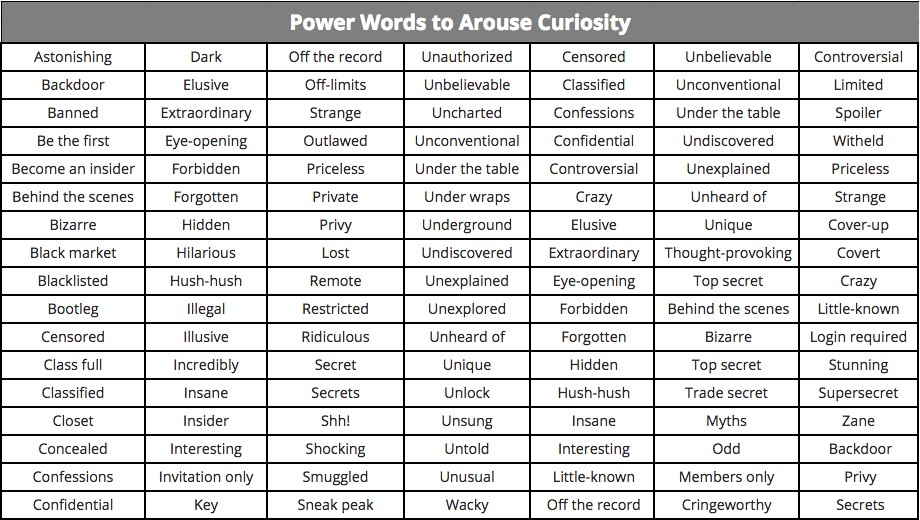
Concepts that do not immediately fit into our worldview immediately stimulate curiosity. You can spark curiosity in your customers by promising something or creating mystery using strange and unusual questions.
It’s easy to stimulate curiosity in the reader by using these power phrases and words in your email subject line.
- 9 Insane Ways to Save on Christmas Shopping
- 5 Secrets of Lead Generation
- Under the Table Ideas for Generating More Organic Website Traffic
Words and phrases that build trust
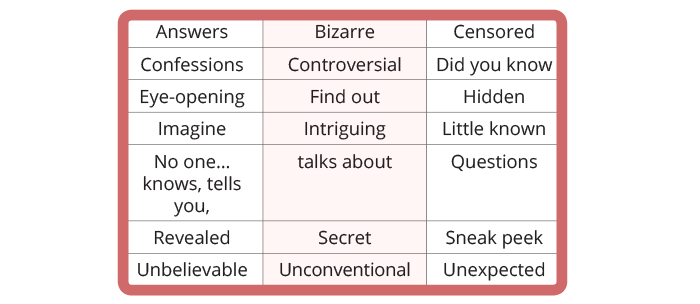
Your word choice can make all the difference when it comes to trust. Tweaking your subject line to display credibility and reliability is a great place to start.
Here are some examples of subject lines that build trust between you and your readers:
- Expert Opinion on Increasing Website Traffic
- Proven Strategies for Business Growth
- Tested Tactics for Boosting Social Media Engagement
- Verified Tools for Enhancing Mobile App Performance
- Tips for Building a Successful Email Campaigns Backed by Forbes Columnist
Words and phrases that exploit vanity
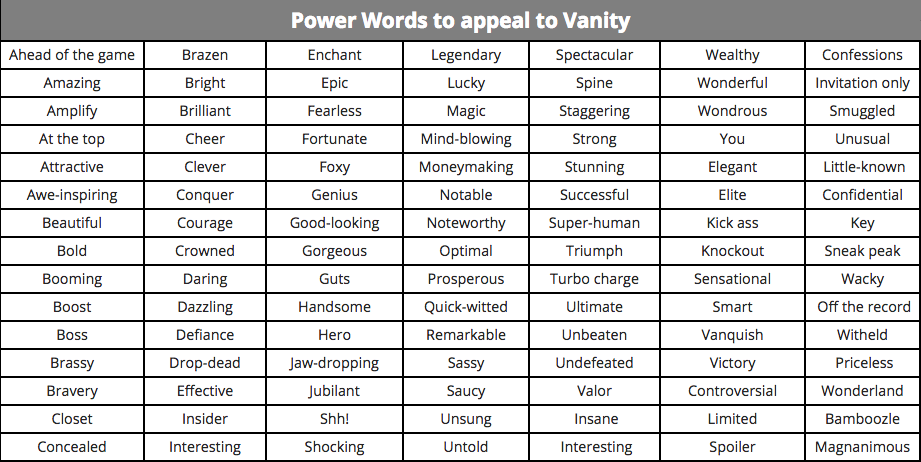
It’s human nature to be proud, if not vain, of our abilities. We all respond to admiration and acceptance. You can use this to your advantage by appealing to your audience’s vanity.
Here are some examples of subject lines that exploit the reader’s vanity:
- Shh! Here are 5 Sensational Beauty Products Used by Celebs
- Off the Record Solutions to boost your sales
- Jaw-dropping Collections to Add to Your Collection
- Stay Ahead of the Game with The Top Social Media Scheduling Tool
- Shocking Success Secrets of the Extremely Wealthy
“Secrets” stimulates curiosity in the last example, while “Wealthy” appeals to the readers’ ego. You can combine several types of power words in your subject line to make it even more effective!
FOMO Subject lines
Fear of missing out (FOMO) refers to a persistent dread that others may be having valuable experiences from which one is excluded. FOMO makes you feel like you’re skipping all the excitement, and we’ve all felt this anxiety in some form or another.
A FOMO subject line taps into your audience’s natural fear of missing out to encourage them to take action. You can leverage FOMO in your email marketing to generate a sense of urgency.
Here are some examples of subject lines that employ FOMO:
- Marketers are Avoiding these 10 Marketing Fails
- [URGENT] Last Day to Stream Revolution Plus Movies
- Last Call for Submissions to Win December Rewards
You have probably realized that just like an affiliate marketing funnel, power words can boost your sales by creating a personal touch. Combine different power word types to appeal to your audience’s emotional touchpoints.
10 Power Words to Add Magic to Your Next Email Campaign
Words have amazing power, so you must apply them wisely. Much like using model risk management to identify wrongful model usage, recognizing the influence of power words can be a game-changer.
You have the ability to easily improve email campaign stats by incorporating power words into your message.
It’s critical to carefully select words in your message and avoid email marketing practices that could derail your campaign. According to research, trigger words can have a serious influence on how your reader reacts to your message.
Seasoned marketers have known for a long time that a few simple tricks, like chatbot support, can evoke the desired feelings and influence behavior. Our brains subconsciously process timely interactions and particular words to assist us in accepting messages.
To help you get started, here is a list of 10 power words to add some magic to your email campaign:
1. New
We all love new things. Whether it’s a new car or new information, the word new seems to always set hearts racing. It sparks curiosity and generates the FOMO if one doesn’t, at least, see what’s on offer. Using new in your email copy is a great way to get the reader’s attention.
2. Free
Speaking of things people love, who doesn’t love free stuff? Nobody, that’s who.
Free is always an exciting proposition. Nevertheless, you should be careful how much you throw the word around. Offering up too much free can come across as being spammy.
Use it only for tangible offers and make sure to follow through on your promise. That way, you can maintain high open rates and reduce the chances of your messages being sent to the spam folder.
3. Because
This one might sound silly, but it’s critical if you’re requesting something or providing solutions to specific problems. People often respond more positively when they are informed of the reason for the request.
It’s a great way to promote transparency and build trust with your customers.
4. You
Using you has been found to immediately draw the reader’s attention. Although the use of the term you differs from real name personalization, it has been shown to increase click-through rates.
To accomplish this, write as if you’re chatting directly to the customer because you actually are. The term you, often referred to as writing in the second person, encourages the readers to experience the narrative as if it were their own.
5. Easy
People respond well to messaging that implies that something has been done on their behalf to make getting an outcome easy. Using it allows the reader to feel adequate and sure that they can follow the message and act on it.
Follow through by actually making your offering easy, whether in terms of access or execution. Other words like streamlined and simple are great substitutes to use in messaging.
6. Discover
You’re not alone in feeling nostalgic when you hear the word “discover.” Many people associate the word discover with their childhood and much simpler times when things were exciting and discovering anything new was fascinating.
Words like discover and unlock can entice a reader to continue reading and open the email, which could lead to more engagement.
7. The Customer’s Name
Whether it’s a promotional email or a newsletter, the subject line should include the reader’s first name. Using the name of a customer in an email marketing campaign is a must-do. It would be foolish not to at least attempt adding personalization to an email.
Personalization is key to a successful relationship marketing strategy. Customers want to feel valued and respected, they crave a special connection with your brand. You can go the extra mile and add the customer’s name to the subject line.
Much like using a customer experience platform, it’s a great way to form meaningful relationships with your prospects and make them feel special.
The icing on the cake is the fact that customers are more likely to open and respond to personalized messages, which will work wonders for your conversion rates.
8. Imagine
Adding imagine to your message allows you to paint a picture in the mind of the reader. You can use this opportunity to describe their desired outcome and draw their attention.
Readers tend to like considering how things could or should be. Leverage this by communicating an exciting outcome to get them to forget their objections and focus on the positives.
9. Instant/Instantly
In the customer’s mind, instant promises some form of immediate gratification. It cuts through the red tape and puts the end result within reach. It helps build trust with customers and shows them that you are committed to transparency.
Customers are used to businesses defaulting on offers and rewards, so using words like instant and instantly is bound to get their attention.
It’s important to note that you should deliver on your promises. Using any of these two words commits your brand and you can be sure customers will judge your entire business on your performance.
10. How-to
Employing how-to is a basic and straightforward strategy to influence reader behavior. Using a line like “How-to Make the Choice Between App Testing Sites”, for instance, tells the customer that they will learn something new by following the link.
People are more inclined to follow through on content that promises a solution.
Critical Features of Successful Email Psychology
Besides deploying power words in your copy, successful email marketing requires a robust strategy. From building your email list to finally sending messages to customers, you must consider several points to convert your audience.
Use Visuals
Including visuals in your marketing improves the odds of campaign success.
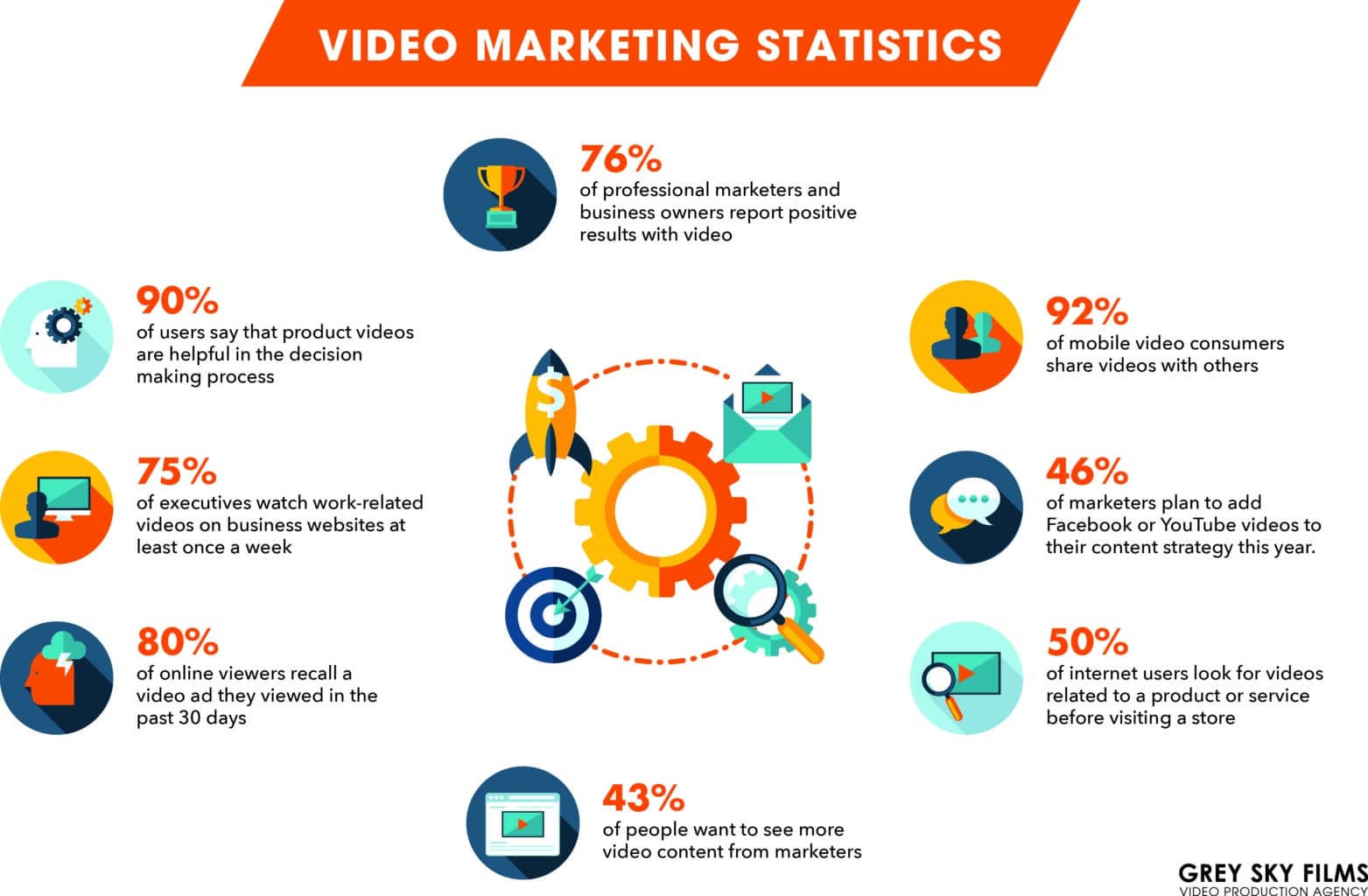
Use visual aids like GIFs, videos, or images to make the message clearer and more appealing. The reader will understand better and also gets to enjoy colorful graphics. Tools like a wireframe can help you determine what works and what doesn’t.
Use informal language
Except for situations where you’re writing to another business, your emails should follow an informal approach to create some form of intimacy. Using an informal tone in your email will help the reader feel relaxed and help them engage better with your message.
Keep it short and sweet
People don’t want to be bothered by long irrelevant messages. Use a straightforward content strategy to deliver value without bombarding the audience with tons of useless information. You don’t want your prospects to lose interest halfway through your message or develop email marketing fatigue.
Get straight to the point and keep the reader engaged with a relevant, well-written copy to encourage them to follow through and take action.
Use captivating subject lines
Subject lines have a significant influence on open rates. A customer will judge the relevance of your message based on the subject line. It’s important to use attention-grabbing subject lines to reel in the reader.
Put the benefits up front and center and keep the reader interested by adding power words. Personalization is a good touch to add to your subject line and will often get the audience to open the email and read its contents.
Psychology of Power Words: Talk Your Way to Email Marketing Success
Words are powerful, and choosing the correct words can make the difference between success and failure in your marketing campaign. Remember that just because a term or phrase works well in one campaign doesn’t mean it will succeed in another. Always be smart when employing marketing power words and phrases, and perform A/B testing to ensure you’re using them correctly.
About the Author
 Jessica Day is the Senior Director for Marketing Strategy at Dialpad, a modern business communications platform that takes every kind of conversation to the next level—turning conversations into opportunities. She is an expert in collaborating with multifunctional teams and sentiment analysis tools to execute and optimize marketing efforts, for both company and client campaigns. Jessica has also written content for Businessmap and Neal Schaffer.
Jessica Day is the Senior Director for Marketing Strategy at Dialpad, a modern business communications platform that takes every kind of conversation to the next level—turning conversations into opportunities. She is an expert in collaborating with multifunctional teams and sentiment analysis tools to execute and optimize marketing efforts, for both company and client campaigns. Jessica has also written content for Businessmap and Neal Schaffer.